NOTE: In late June 2008 I wrote a four post series on Match Types. These posts continue to get a lot of traffic, but having them broken up leads many people to see/read only part of what is essentially one idea. So to better share this information these four posts are combined here to make it easier to enjoy.
————————————–
The Perfect Match Type
Match Type is the PPC option which has perhaps the highest impact, is the least understood, and is most often under-utilized.
In this post, I’ll take a long look at the Match Type option and how and why you should use it to improve your paid search campaigns and results.
Match Game
The Match Type option is the primary connector between your keywords and the search queries users actually enter into the search engines. Each keyword has a Match Type associate with it, which defines how the keyword is connected to queries. On Google we have these options:
- The EXACT Match Type turns the keyword into a rifle. It will only cause your ads to be displayed when the query is identical to the keyword. (At least in theory, we’ll cover some real world exceptions later).
- The PHRASE Match Type turns your keyword into a shotgun. It will hit anything surrounding the keyword as long as the query contains your purchased keyword(s) with anything before or after them.
- The BROAD Match Type turns your keyword into a bomb. It will explode in all directions and send debris and shrapnel farther and wider than you had ever imagined. In other words, the keyword can match pretty much any query the search engine decides is even tangentially related. (There will definitely be more on this later).
In addition to these Google now offers ‘Automatic Matching’ as we’ve written about previously.
The theory of these basic Match Type definitions are easily understandable – but in practice deciding the right Match Type isn’t always easy.
The problem is that each Match Type is a filter of sorts, letting certain queries through and stopping (or reducing the probability of) your ad from showing for other queries.
But these are rather coarse filters, and when considered against the massive diversity of search queries that users type when looking for something, plus the impact of other factors such as bids, quality score, and competitors, any Match Type choice becomes a pretty large compromise.
A Brand New Example
Let’s consider what might appear to be the simplest of all Match Type situations; your company name. Suppose that you’re running the paid search campaign for the well-known excess-capacity auctioneer Whaazooh.com.
What Match Type should you place on the brand name keyword ‘Whaazooh’?
- If you buy ‘Whaazooh’ on Exact Match, your ad is eligible to run only when the search query is ‘Whaazooh’ (or ‘whaazooh’) but miss every other direct variation (‘whaazooh.com’, ‘whaazooh inc’, ‘Whaazooh acutioneers’ as well as the mis-spellings ‘waazoo’. Of course, you also don’t get any of the contextual but not literal search queries either – you’ll miss ‘liquidation auctioneer in Palookaville WI’ and thousands of other searches who were intentionally or conceptually asking a question that your ad could have answered.
- If you buy ‘Whaazooh’ on Phrase Match, your ad is eligible to run for ‘Whaazooh’ or ‘whaazooh’ and direct variations that include ‘whaazooh’ such as ‘whaazooh.com’, ‘whaazooh inc’, ‘Whaazooh acutioneers’, ‘shop at whaazooh’ or even ‘whaazooh sucks and you should never do business with them’. You’ll still not be running (at least due to this keyword) for any conceptually related searches.
- If you buy ‘Whaazooh’ on Broad Match – the default and most popular match type, everything is potentially covered. You’re ad is eligible to run for ‘whazzooh inc.’ and ‘whaazooh reviews’ and even ‘excess diamond tip drill bit dealers’. You’ve officially cast a wide net.
Each step from Exact to Phrase to Broad opens you up to a larger quantity of (generally) less specific search queries. Some of these incremental queries are relevant and will prove profitable, but many will be irrelevant, or at least low converting.
 Buying ‘Whaazooh’ on Phrase match means you could easily pay for the click of someone who searched ‘Boycott Whaazooh’. And on Broad Match you almost certainly will pay for the clicks of people who searched for things which are 100% unrelated to your company, products, and industry.
Buying ‘Whaazooh’ on Phrase match means you could easily pay for the click of someone who searched ‘Boycott Whaazooh’. And on Broad Match you almost certainly will pay for the clicks of people who searched for things which are 100% unrelated to your company, products, and industry.
So deciding the right Match Type requires balancing the benefits of progressively more diverse query matches against the risks of progressively more diverse query matches.
But for most keywords there is no perfect balance. You’re left to try and find the most acceptable compromise between volume and profitability.
Building Filters With Keywords and Match Types
The problem is actually somewhat easier to solve if we think about it in terms of a group of keywords all working to attract a set of related queries.
This is also more akin to your real world ad-groups, where there are many related words and phrases and each, depending on the Match Type could attract queries related to the same subject or using the same terms. Often even the same keyword will be purchased multiple times within one campaign, setting the Match Type differently in each instance.
In this way you can build a layered keyword trap, using the Match Type option (along with our Bid and several other controls) to specifically capture certain queries at the Exact Match level, others at the Phrase Match Level, and still more at the Broad Match level.
Considering the ‘whaazooh’ brand for example, we can buy the keyword and some related phrases separately at Exact, Phrase and Broad Match Types, and (assuming proper bidding and quality scores) we’ll catch specifically targeted queries at each layer while letting others fall through to be caught (or not) by the levels below.
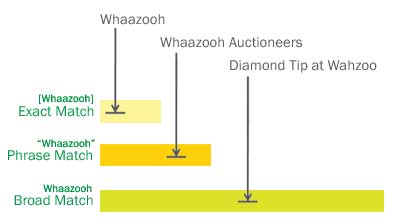
Over time, by watching the queries that each keyword attracts we can tune this system quite precisely, not only filtering unwanted queries with new negative keywords, but expanding our total volume through quality score and bidding improvements and tailoring the ROI of different query classes.
In a later post we’ll take a detailed look at this tuning process.
Taking Control
The great benefit of this model is that it lets us take pretty significant control over the keyword to query matching process back from the search engines.
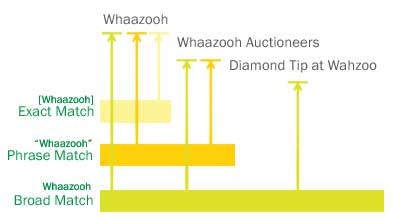
Rather than just buying Broad Match keywords and letting the engine decide which queries are important, or buying just Phrase or Exact Match keywords and missing out on a lot of volume, we set the stage to have the best of all worlds.
And with proper Ad-Group and Campaign configurations and good tracking software we’ll have amazing visibility into our progress, so we can understand things clearly and tune rapidly.
The Match Type Keyword Trap
Above I introduced the idea of building a Match Type Keyword Trap. This layering of keyword & match type combinations provides control over which, where, and how queries are attracted, and therefore their cost-per-click.
In the simplest case, you’d buy one keyword (say ‘Whaazooh’) three times in one campaign – once on Exact Match, once on Phrase Match, and once on Broad Match.
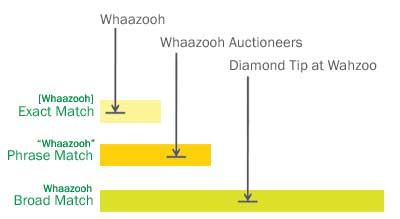
The goal is to catch all queries which are literally ‘Whaazooh’ with the Exact Match keyword, all queries which are ‘Whaazooh’ plus some word(s) before or after it with the Phrase Match, and all other related queries with the Broad Match.
Why?
Because in almost every case where many different queries exist for a single word or topic, some of those queries are very valuable, some are mildly valuable, and many are not valuable (or at least not valuable enough). We want to segregate these queries by their value to us so we can pay highly for the high value ones and less so for those less valuable.
In the simple cases (I have to keep saying that because not all cases are simple, there are many complex variants of this) we’ll do better by trapping the best ones with the most specific Match Types (Exact if possible or Phrase if not) and using Broad Match to harvest winners and losers which are acted upon accordingly.
Winners are promoted (to Phrase Match or Exact Match). Losers are demoted via lower bids or even made into negative keywords.
We do better not because of the place they’re trapped, but because by segregating them we control the bid (as well as the text-ad, landing page, etc.)
Forcing The Stack
Buying the same keyword three times at different match types does not fully bait the trap. It’s a good idea to use staggered bids to give it some extra oomph.
Google says that keywords that are ‘more specific’ will always match first. This means that if a query matches an exact match keyword, that should always match before an eligible phrase or broad match keyword.
But experience shows this doesn’t always happen – some small percentage of the time the less specific keyword gets the match. It maybe that if the quality score of the broader match keyword is higher, that one wins out anyway.
To avoid this, and because the ‘more specific’ match type keywords should produce higher returns and be worth more to you, it’s a good idea to further force the trap by stacking the bids – higher for the Exact Match versions and sequentially lower for the Phrase and Broad Match versions. This gives the Exact Match keyword multiple reasons to attract and win the Exact Match queries; it is a better match and it will have a higher ad rank (bid x quality score) to drive it up in the auction.
When you do this, leave enough room between the various bids. The Average CPC the engines report are averages, so expect a range of bids in each and leave enough room so the ranges don’t overlap.
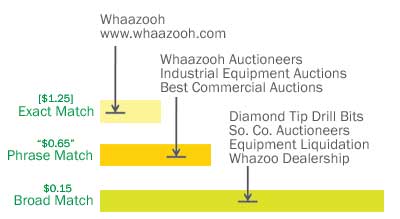
In this example, we bid higher for several terms that have proven great performers, setting them on Exact Match and bidding $1.25. Several others that are good performers and perhaps come in some variations are set at Phrase Match for $0.65. A larger collection of phrases and concepts are bid Broad Match at $0.15. Over time we shift, add, put in more negatives, and generally take control over how we pay for and catch queries.
Equalizing Return
How do you know if it’s working?
In theory you’ll normalize the ROI (or ROAS if you must) for your Exact, Phrase, and Broad Match keywords.
In other words, you’ll raise bids for your Exact Match keywords to maximize profits. You’ll set accordingly lower bids on Phrase and Broad Match keywords until they produce the same return as the Exact Match does – so their lower conversion rates and ROI are compensated for with proportionally lower bids.
Suppose your exact match keyword converts one out of ten times. And the broad match version converts one out of 100 times. In this case, assuming equal sales revenue and net profit in each case, you can afford to bid 10X higher for the exact match keyword than the broad match version. Each keyword get the bid it deserves.
Tuning Your Match Type Keyword Traps
 When you buy the same keyword at different match types, or different keywords and phrases at different match types in a coordinated effort to properly target and value queries, your initial settings will be less than perfect.
When you buy the same keyword at different match types, or different keywords and phrases at different match types in a coordinated effort to properly target and value queries, your initial settings will be less than perfect.
You don’t know what queries you’ll see, the price you’ll pay for each, or how they’ll perform in terms of conversions.
But you can monitor and measure each of these over time, and make adjustments to create a more effective trap.
There are three controls you’ll primarily use to tune the trap:
- Negative Keywords – Without question your campaigns will see (and you’ll pay for) queries that are either undesirable or prove to be poor performers. You should continually review query reports and add keywords as negatives either to all appropriate ad-groups, or to those which have bids above the keyword value.
- Add or Move Keywords – As you review the queries caught by each keyword and ad-group, and the performance of both queries and keywords, there will be interesting or well performing keywords which should be moved up the match type & bid hierarchy.If a query is performing exceptionally well against the Phrase Match option, for example, you might want to create an Exact Match copy of that keyword and give it a higher bid. This should cause that query to be grabbed by your new Exact Match and yet let other matches to that Phrase Match keyword keep matching there.Well performing keywords in the Broad Match group (which is usually bid particularly low) are especially good candidates to be ‘promoted’ into the higher-bids & more targeted environments of the Phrase Match or Exact Match ad-groups.
- Raise or Lower Bids – Based on your goals (revenue or CPA or ROI or whatever) and reflecting the measured performance of the purchased keywords, find the right shape of the pyramid by bidding good Exact Match performance up and cutting Broad Match bids as you negative out losers and promote winners.
I should have pointed out somewhere earlier, that by far the best way to configure the MTKT is to separately each keyword group with different Match Types into separate Ad-Groups. This makes reporting and measurement easier, and allows you to control negatives at the right level.
As a naming convention , we end each Ad-Group name with a (E) if it holds Exact Match keyword, (P) if it holds Phrase Match keywords, and (B) for Broad Match. This makes is much easier when visually inspecting reports or making account changes.
Measuring Progress
Success with your MTKT is achieved when you’re attracting only desirable queries and have maximized ROI by setting bids according to conversion profitability.
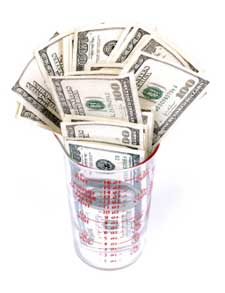 Reviewing the queries on an ad-group by ad-group basis is the cornerstone of the process. The Exact Match keywords should be clear and profitable. The Phrase Matches should be on target or quickly either promoted to Exact or made into negatives. And the Broad Match should also winnow down in many cases (but not always) through promotion or negative creation.
Reviewing the queries on an ad-group by ad-group basis is the cornerstone of the process. The Exact Match keywords should be clear and profitable. The Phrase Matches should be on target or quickly either promoted to Exact or made into negatives. And the Broad Match should also winnow down in many cases (but not always) through promotion or negative creation.
In some cases the Broad Match ad-groups are ultimately turned off, or left running with extra low bids just to capture any potentially new and interesting queries.
Results are harder to summarize, although as pointed out in the previous post, what you normally shouldn’t see is great variation between the ROI (or ROAS if you must still use that horrid metric) for the different Match Type divided ad-groups.
There are exceptions, but they should be positive ones where Exact Match, or more rarely Phrase Match groups are extremely profitable while others are just normally so. But very low or negative returns are a sign that either the queries being attracted just don’t have potential, or else something later in the chain is wrong – ad-text, landing page, offer, checkout process etc.
Match Type Rock Scissors Paper
So fare I’ve discussed the how’s and why’s of buying the same or similar terms at the same time with different Match Type settings. Buying multiple terms and multiple levels – when done correctly – has the ability to give you control over which queries are caught at which price.
Exact-Phrase-Broad
One reason this works is because the engines (generally) execute the match types sequentially.
 In other words, if you are bidding on the same keyword, or two keywords that would both match for one particular query, an Exact Match should take precedence over a Phrase Match which should take precedence over a Broad Match.
In other words, if you are bidding on the same keyword, or two keywords that would both match for one particular query, an Exact Match should take precedence over a Phrase Match which should take precedence over a Broad Match.
So even though a particular query is technical a match for both one Broad Match keyword and another Phrase Match keyword, the Phrase Match should always ‘win’ and catch that query.
I should hasten to point out, this will not always be true. If you carefully watch query reports for your keywords you will see queries that were exact matches against a keyword you had set to Exact Match, yet the query lands in a Broad Match group. But in our experience these are rare in the sub 1% range of all queries.
Emphasis the Match Type Setting with Higher Bids
![]() You can and should add punch to this precedence by ALWAYS placing rather substantially higher bids on your Exact Match vs Phrase Match, and Phrase Match vs Broad Match when they’re stacked in targeting the same terms.
You can and should add punch to this precedence by ALWAYS placing rather substantially higher bids on your Exact Match vs Phrase Match, and Phrase Match vs Broad Match when they’re stacked in targeting the same terms.
And make the differences between the bids significant – it generally won’t help to bid $0.05 more for Exact Match than Broad Match. When bidding it’s easy to look at your Max CPCs (since that’s the option used to set the bid) but since your actual and average CPC is usually just a fraction of the Max you really can’t base your decision on those. Look instead at average CPC’s being reported and then set the Max’s at large enough intervals to create real steps between the different keyword/match type combinations.
By placing a substantially higher bid on the match type differentiated keywords, you’re providing another algorithmic reason for the engine to match exact match queries to your Exact Match keywords. Of course, it should also be true that you want generally higher position and higher impression share for the keywords you’re bidding on Exact Match.
A Simple Match
At the start of this series I mentioned that Match Type was a powerful and often under-utilized option. I hope this post has covered some of the ways you can get more out of these options.



